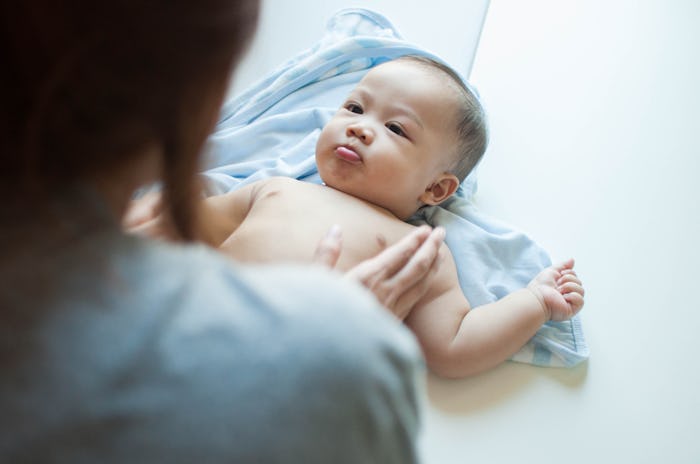Life

These 5 Fast-Acting Diaper Rash Solutions Will Help Your Baby Feel Better Sooner
It seems that no matter how often you change your baby’s diaper, there's bound to be some redness on their rump at some point. And since the last thing you want is for your little one to be uncomfortable, you’ll need some fast-acting diaper rash solutions. Because at some point, almost every baby gets diaper rash — and it probably won't be your fault if it happens to your little one.
“Even if a parent is on top of diaper changes, the combination of moisture and lack of air on the sensitive skin of a baby or toddler can cause them to develop a diaper rash,” Dr. Mona Amin, M.D., a board-certified pediatrician, tells Romper in an email. There are other aggravating factors, too, Dr. Amin continues.
“Diaper rashes are common because of the increased moisture present from urine and poop in the diaper and too little air,” she says. “It can be caused by contact with poop (which contains enzymes and bacteria that can irritate a baby’s sensitive skin) or pee (which contains ammonia that can be equally as harsh on your baby’s butt).”
Diaper rash can stem from other irritants as well, like yeast. “Yeast and bacteria live on our skin in normal, healthy levels but when the irritation snowballs, it can often cause these to overgrow in the diaper area,” explains Dr. Amin. And it doesn’t take long for the rash to appear; sometimes all it takes is a few hours.
Typically, diaper rash disappears after 2-3 days, Kids Health reported. But if your baby’s rash appears to get worse (i.e. there are sores, your child has a fever, or there is pus coming out from the rash), you should speak to your child’s pediatrician. “It’s important that if a diaper rash is not healing with conventional over-the-counter ointments that you speak to your child’s doctor,” says Dr. Amin. “Not all diaper rashes are created equal and it’s important that if a diaper rash is getting worse, that you speak to your child’s doctor to make sure prescription ointments are not needed.”
If your baby's diaper rash is still mild enough to be treated at home, these pediatrician-approved remedies have helped babies for decades.
1Zinc Oxide Creams
When it comes to calming diaper rash, you can’t go wrong with zinc oxide. Used in many skin care products, zinc oxide helps to form a barrier on the top of the skin that protects the area from any further irritation, giving the underlying skin time to heal. Diaper creams that use zinc oxide (like Aquaphor Fast Relief Diaper Rash Paste or A&E Maximum Strength Diaper Rash Ointment) can help your baby’s bum.
2Cornstarch
When it comes to clearing up diaper rash, cornstarch is an oldie but a goodie. While it can wick away moisture, it doesn’t necessarily create a barrier to protect your baby’s bottom. It’s safer to use than other dusting powders, since it doesn’t contain talc. “Make sure to avoid using talc-based powders as can be harmful to lungs when inhaled by baby,” says Dr. Amin. Only use cornstarch on the affected area and use it very lightly, so that your baby doesn’t breathe it in.
3Warm Water
If diaper rash has your baby feeling irritated, you can always give their backside a good soak. Pour warm (not hot!) water gently over your baby’s tushie. Not only does this help offer extra cleansing, but it can calm the rash down, too.
4Blow Dryer
Used on a cool setting, your hair dryer can help to get your baby's bottom super dry. Try a quick blow dry before you put their diaper back on to keep overall moisture levels down and prevent further irritation.
5Open Air
Depending on how bad the diaper rash is (and how brave you are), you can always let your little one go au naturel for a little while. “Leaving your child’s bum open to air to allow the skin to air out can speed up healing,” says Dr. Amin. Sure, you might have to clean up some pee spots, but their tush will feel totally better.
Expert:
Dr. Mona Amin, M.D., board-certified pediatrician